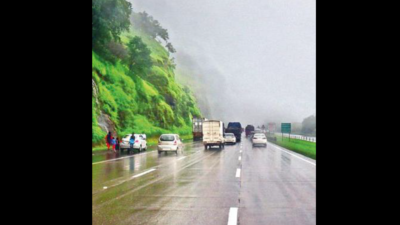On Pune-Mumbai Expressway, speeding & lane cutting galore

The transport department keeps conducting random and sudden campaigns on the eway
PUNE: A recent campaign of the state transport department on the Pune-Mumbai expressway established that lane cutting and speeding continued to be the most common offences.
"During the campaign held in July and August, about 50 cases of speeding and more than 530 cases of lane cutting were identified, and the offenders were penalised. The transport department keeps conducting random and sudden campaigns on the eway, and more will follow. While deploying officers for long periods is not possible due to workforce constraints, such campaigns act as a deterrent," said a department official.
A similar campaign conducted in March this year also recorded maximum cases about the same offences. The drives conducted by the Highway Safety Patrol (HSP) also highlighted the same offences.
Commuters on expressway expressed concerns about the frequency of similar offences being on the higher side. "After so many campaigns, the instances of lane-cutting and speeding should have come down by now. I am a regular on the eway, and lane cutting happens majorly because of heavy vehicles using all the lanes. At times, two to three trucks ply parallelly, forcing smaller vehicles to cut lanes. If lane cutting and speeding have not come under control despite so many campaigns, it means they have had no effect on motorists," said Ravindra Nagre, a businessman.
"Technically, heavy vehicles are supposed to ply on the left lane (third lane) of the highway. The intelligent traffic management project, currently in a crucial stage of surveys, on the highway would be ready by June next year. As many as 300 cameras would be installed at 93 points to identify traffic violations," said an engineer with the Maharashtra State Road Development Corporation (MSRDC).
Harshad Abhyankar, the director of the Save Pune Traffic Movement, said current drives focus on outputs rather than outcomes. "While regular campaigns are important, the agencies should focus on two major offences - lane cutting and speeding - and do all that is needed to curtail these issues permanently over a period of six months to a year," Abhyankar told TOI.
"During the campaign held in July and August, about 50 cases of speeding and more than 530 cases of lane cutting were identified, and the offenders were penalised. The transport department keeps conducting random and sudden campaigns on the eway, and more will follow. While deploying officers for long periods is not possible due to workforce constraints, such campaigns act as a deterrent," said a department official.
A similar campaign conducted in March this year also recorded maximum cases about the same offences. The drives conducted by the Highway Safety Patrol (HSP) also highlighted the same offences.
Commuters on expressway expressed concerns about the frequency of similar offences being on the higher side. "After so many campaigns, the instances of lane-cutting and speeding should have come down by now. I am a regular on the eway, and lane cutting happens majorly because of heavy vehicles using all the lanes. At times, two to three trucks ply parallelly, forcing smaller vehicles to cut lanes. If lane cutting and speeding have not come under control despite so many campaigns, it means they have had no effect on motorists," said Ravindra Nagre, a businessman.
"Technically, heavy vehicles are supposed to ply on the left lane (third lane) of the highway. The intelligent traffic management project, currently in a crucial stage of surveys, on the highway would be ready by June next year. As many as 300 cameras would be installed at 93 points to identify traffic violations," said an engineer with the Maharashtra State Road Development Corporation (MSRDC).
Harshad Abhyankar, the director of the Save Pune Traffic Movement, said current drives focus on outputs rather than outcomes. "While regular campaigns are important, the agencies should focus on two major offences - lane cutting and speeding - and do all that is needed to curtail these issues permanently over a period of six months to a year," Abhyankar told TOI.
FOLLOW US ON SOCIAL MEDIA
FacebookTwitterInstagramKOO APPYOUTUBE
Start a Conversation
end of article









